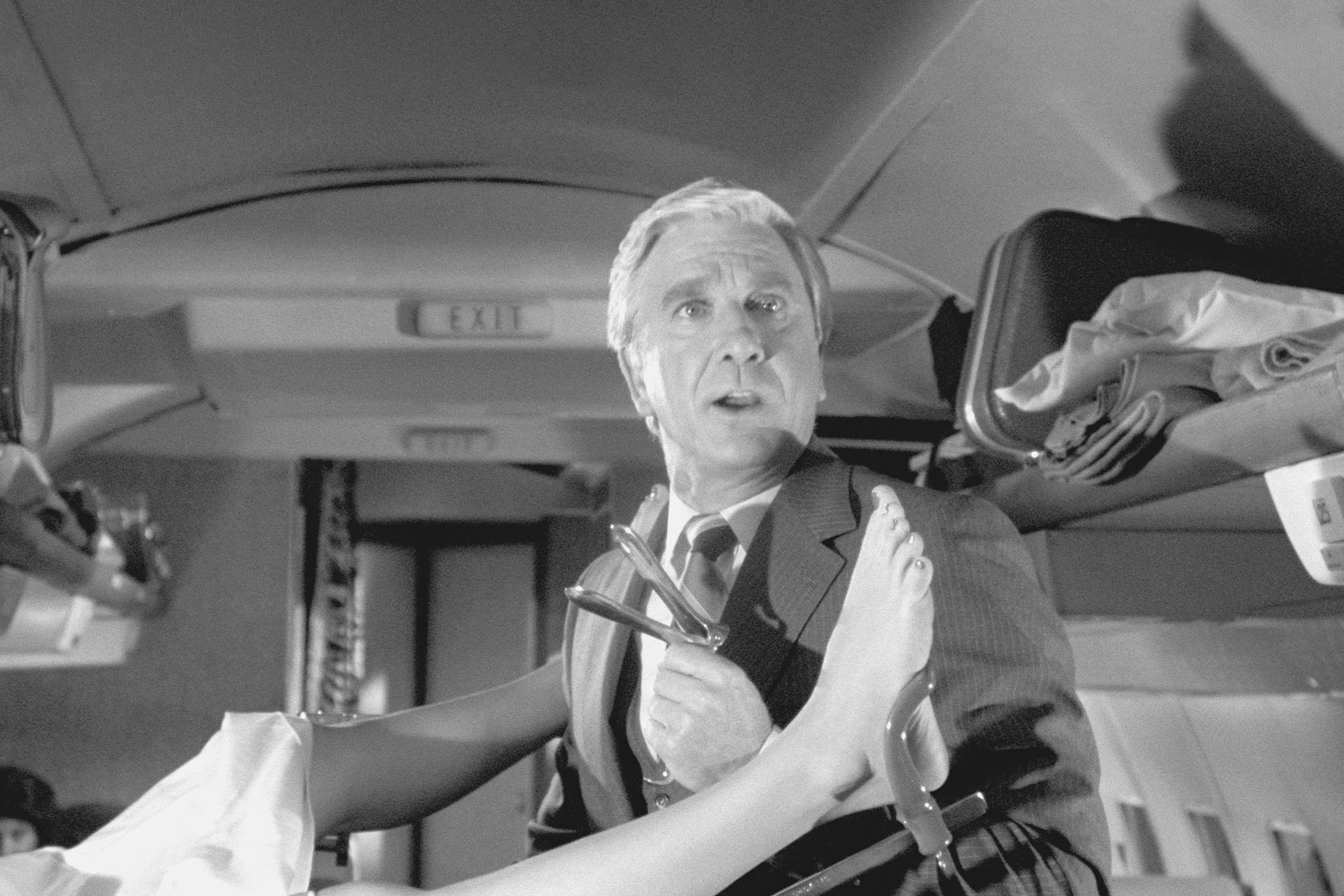“Airplane!” has been hailed as one of the funniest movies ever made —usually by anyone who has seen it. Forty-three years after its premiere, it still has audiences rolling with laughter. The brainchild of David Zucker, Jim Abrahams and Jerry Zucker (collectively known as ZAZ), the film is a parody of the B-movie “Zero Hour!” where a character really does say, “The life of everyone on board depends upon just one thing: finding someone back there who can not only fly this plane, but who didn’t have fish for dinner.”
“We told the actors, ‘Play it straight.'”
Such is the absurdity of the ZAZ world, which plays its comedy with deadpan seriousness, and why “Airplane!” is so uproarious. The filmmakers (making their debut as directors) cast serious actors — Peter Graves, Robert Stack, Lloyd Bridges and Leslie Nielsen — in prominent roles, and made them say outrageous things, such as “I picked the wrong week to stop sniffing glue,” as if they were in a drama. The film is inspired because the actors are not winking at the audience. Even cameos by everyone from Kareem Abdul-Jabbar to Barbara Billingsley are hilarious because they are done with a straight face. ZAZ prided their humor on getting audiences to appreciate the deadpan tone. This may be why the film is so quotable, but there are sight gags, and jokes in the background that require repeat viewings to catch.
The new book, “Surely You Can’t Be Serious,” cowritten by the filmmakers, recounts how “Airplane!” got off the ground. The trio built their comedy starting with theatrical skits, and a feature, “Kentucky Fried Movie,” before writing “Airplane!” and navigating Hollywood hoping to get it made. Even when they finally got approval, they wanted to direct and collaborate on casting and editing. The filmmakers recount their struggles and successes in the book, name-dropping Jonas Salk, O.J. Simpson, Michael Jackson and others, as they mined comic gold and made one of the most profitable and influential comedies ever. As someone in the book notes, there is life before “Airplane!” and life after “Airplane!”
The filmmakers/authors spoke with Salon about their comedy classic.
Everyone has an airplane story. What is your wackiest, strangest, or more exciting airplane trip?
Jerry Zucker: I guess the one where I crashed in the Andes and had to live off the land and the animals for about three weeks.
Jim Abrahams: And you ate a few of the other passengers.
David Zucker: He doesn’t talk about that!
Jerry Zucker: Just one or two, and they were practically dead.
David Zucker: But tasty, I hear.
Abrahams: I don’t know if I actually had anything exciting or memorable happen on an airplane.
David Zucker: Memorable — there was that time when we flew to London to do press and Jerry forgot his passport, but the actual flight was uneventful.
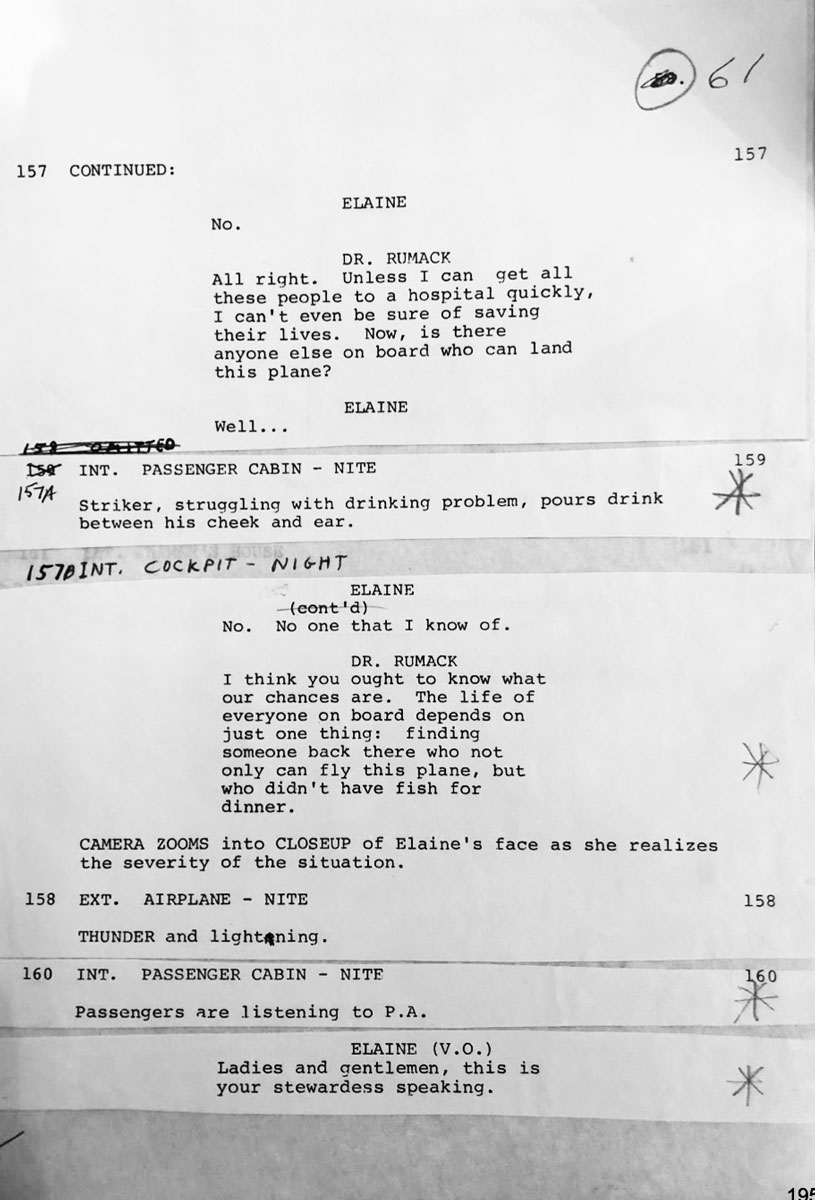 A page from the “Airplane!” script (Courtesy of the authors)You “seized a moment” and followed your dream to write a comedy with no connections, no experience, and not really with an idea. What observations do you have about making “Airplane!”?
A page from the “Airplane!” script (Courtesy of the authors)You “seized a moment” and followed your dream to write a comedy with no connections, no experience, and not really with an idea. What observations do you have about making “Airplane!”?
Jerry Zucker: We take the reader through everything that led up to “Airplane!” The experience we had was doing comedy. Being pranksters and goof-offs. We started Kentucky Fried Theater and did “Kentucky Fried Movie.” In that sense, we didn’t have any film experience, but we felt we knew how to make people laugh.
Jim Abrahams: We got our start filming stuff on our own and making spoofs of commercials. Back then, no one had cell phones, so we were unique — we had a video machine. We could film and edit and show it to other people and get their reactions. That was the school we went to.
David Zucker: We learned a lot about directing from “Kentucky Fried Movie,” being on the set as writers watching John Landis direct. We just learned along the way.
We need your help to stay independent
Yes, but you ended up having control over directing and casting that first time filmmakers almost never got.
Jerry Zucker: Here’s the secret: We were too naïve to know we couldn’t get any of that stuff. So, we pushed and ended up getting most of what we needed. There was naivete involved, but if we had really known how the movie business works and paid attention to the odds, it may have been more daunting. We were three people with one singular vision of a certain kind of movie and style of humor we wanted to make and didn’t pay attention to anything else. We just kept pressing through.
David Zucker: We saw what was out there at the time, Woody Allen and Mel Brooks, and they were great, and we thought we could do that and be as funny.
Abrahams: Maybe we should have called the book “Ignorance is Bliss.”
David Zucker: You are quoted as saying that “ignorance is bliss.”
Abrahams: Really?
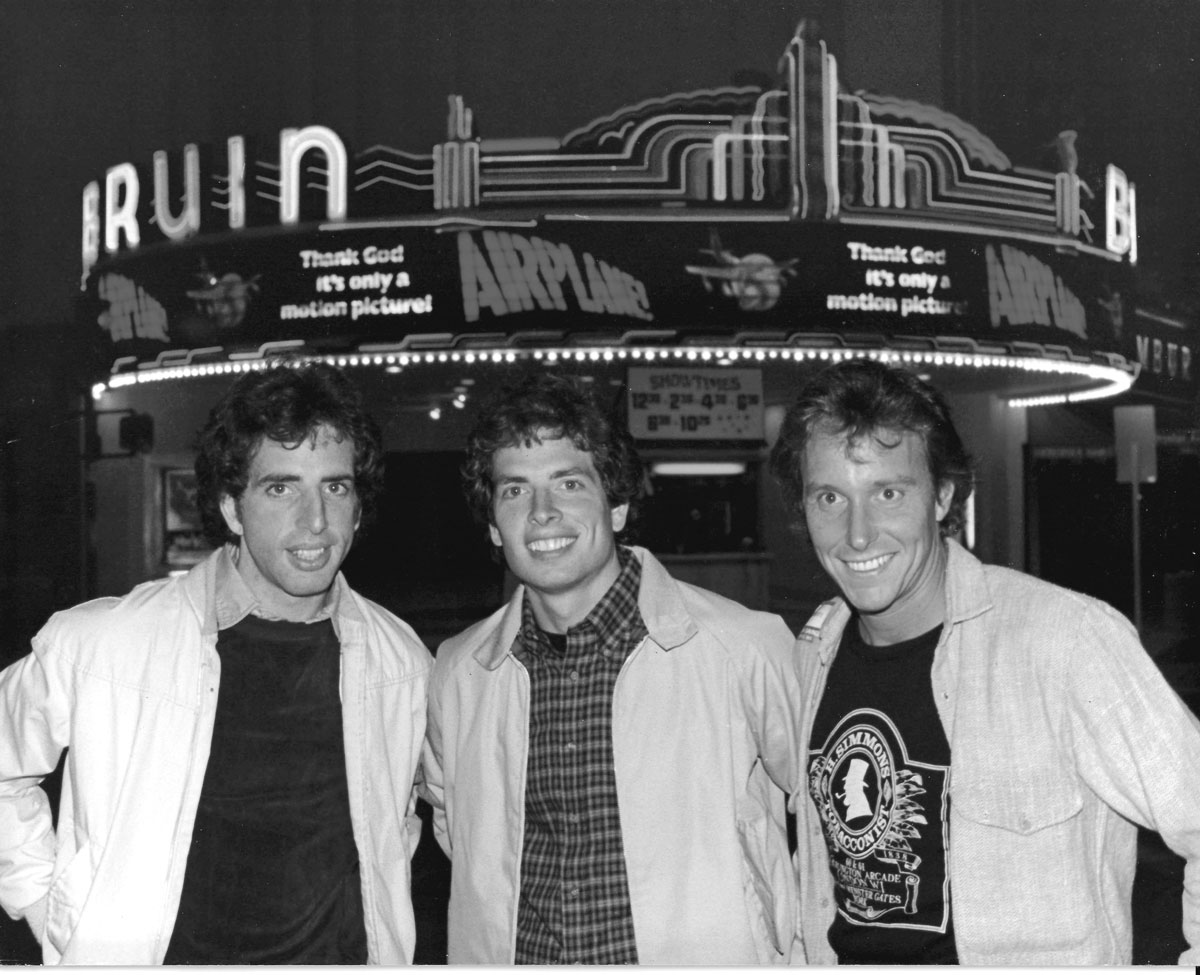 At the Bruin premiere of “Airplane!” (Courtesy of the authors)The humor in the film works because you raise stupidity to an art form. There are sight gags, reference to other films, wordplay, and fart jokes, absurdism and more. You write that jokes have to be plot points and plot points have to be jokes. You poke fun at genres. Can you discuss why all these different elements work in this one film, and why it is so beloved?
At the Bruin premiere of “Airplane!” (Courtesy of the authors)The humor in the film works because you raise stupidity to an art form. There are sight gags, reference to other films, wordplay, and fart jokes, absurdism and more. You write that jokes have to be plot points and plot points have to be jokes. You poke fun at genres. Can you discuss why all these different elements work in this one film, and why it is so beloved?
David Zucker: We connected to a lot of 11-year-olds on that level.
Jerry Zucker: We watched a lot of serious, hard-hitting movies and it’s a style of acting that is still around. It was really big in the 1950s, and maybe it was coming from Milwaukee. We didn’t take those shows seriously and laughed at how silly it was that they were taking themselves that seriously. So, it became about duplicating the whole style, the look, the acting and costumes and putting our jokes in. We never wanted it to be funny. We told the actors, “Play it straight. Pretend that you don’t know that you are in a comedy. Be naïve of the fact that people may be laughing at this. Everyone has to do this as if it was a real B-movie.”
David Zucker: For a lot of the actors, it was a big step and a risk. They had to have trust in us that it was going to be funny.
Abrahams: As Jerry alluded to, we learned the details as we went along, but from the time we were kids, it was an instinct in us to do this kind of comedy. We saw how many things were taken seriously, especially in the media and TV and movies. Our instincts told us we don’t have to take that seriously.
David Zucker: Not only that, we had some outside influences, like “MAD Magazine,” that was a textbook for us. Back in Milwaukee at age 10, we saw a feature in “MAD Magazine” called “Scenes We’d Like to See.” They’d set up a serious scene from a movie and do the scene they thought it should be, and it was very much like “Airplane!”
Abrahams: It was to elevate that beyond media to everyday, and you reference that in your question about how stupid our jokes are. When stupidity is elevated — and there is lots of stupidity in society — it needs to be acknowledged in parlance and verbiage, and everyone will say, “Surely you can’t be serious?” is a serious line. But if we acknowledge that, we all can celebrate it.
David Zucker: And it made all the difference to have that be in the context of a serious melodrama, and have the lines delivered by serious actors, like Stack, Bridges, Nielsen and Graves.
What about scenes that might be seen as pushing the envelope now? The jive talk, the pedophilia jokes, the breasts, the abortion joke and more. The film treads the line of tastelessness, but it never oversteps. Julie Hagerty blowing up Otto is pure naughtiness only if you see a sex joke there. You went from the very R-rated “Kentucky Fried Movie” to the PG “Airplane!” Can you discuss?
Jerry Zucker: Our theory was to let the audience find things. Not every joke, but if there’s something in the background that is funny, we don’t point to it. We love the fact that if you see it, you feel you are discovering it. That works in a lot of ways when people are being that serious, but they are saying something silly.
Abrahams: It’s very subjective stuff. We’ve been working with the publishing company on how they will advertise the book. And one suggestion was showing “Nun’s Life” magazine, but instead of the nun on a surfboard, like in the movie, instead, the nun is smoking a cigar and getting drunk. We objected to that because there is a fine line. It’s subjective, because there is something genuinely offensive about a nun smoking a cigar and getting drunk opposed to a nun surfing.
David Zucker: One of the ad guys at the publishing company said, “I’m Catholic, and I agree with you.” But there is that fine line.
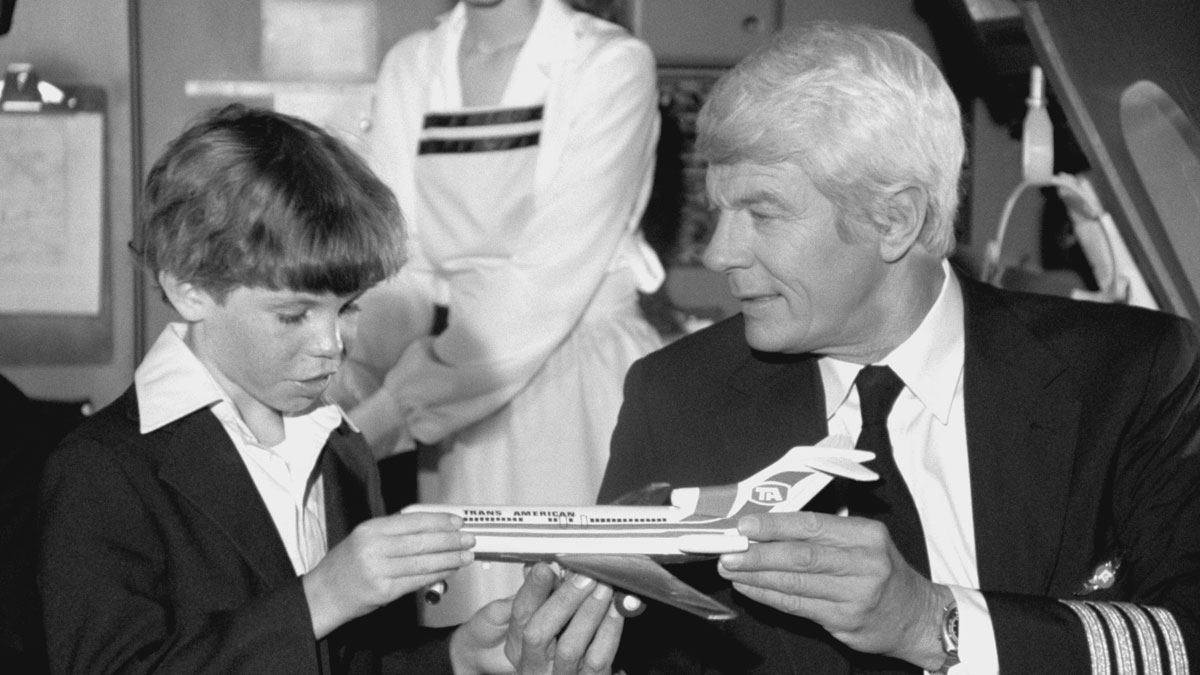 Rossie Harris as Joey Hammond and Peter Graves as Captain Over in “Airplane!” (Paramount Pictures)That’s why I love your film — you go right up to the line and don’t cross it.
Rossie Harris as Joey Hammond and Peter Graves as Captain Over in “Airplane!” (Paramount Pictures)That’s why I love your film — you go right up to the line and don’t cross it.
Jerry Zucker: I don’t think there is anything tasteless in the movie. People might find it tasteless. And if we were to do it now, they wouldn’t want us to do the pedophile joke — but it doesn’t do any harm. Taste is as Jim said, subjective, but I always default to, “Are we doing any harm?” If we are doing a joke that is mean-spirited or racist or whatever, then we shouldn’t do it. But the stuff that is borderline — people say you couldn’t do the jive talk today — but every Black person we ever met said they love the joke. It is people being overly sensitive on behalf of people they think should be sensitive.
David Zucker: The question we ask is does it make a satirical point? There was a lot of raunchy stuff in “Kentucky Fried Movie,” but it made a point. The Peter Graves and little boy scene was making fun of the straitlaced image of pilots in a lot of movies.
“Barbara Billingsley, she’s the perfect white lady you would never think of in a million years could translate jive.”
Abrahams: We did it 40 years ago but today, there are these YouTube channels where people watch “Airplane!” for the first time. They weren’t alive when “Airplane!” was made, and it all holds up. No one ever says, “Oh gosh, that doesn’t work today.” It may be that you won’t find an executive today who would greenlight that movie, but nonetheless, the movie itself holds up.
The casting in the film is exceptional and you talk about lobbying for actors who don’t get the humor, auditioning folks like David Letterman, who was grateful he didn’t get the part, to landing Robert Hays and Julie Hagerty, as well as getting a cameo from Ethel Merman and the joy of Kareem and Barbara. What convinced you that the casting would work?
David Zucker: With the casting of Stack, Nielsen, Graves and Bridges, the really straight guys, we were into dubbing our own voices on old movies. That was fun, and that’s how we thought of doing “Airplane.” Why not actually cast those guys? We had experience getting laughs making fun of that acting style. We had confidence that style would work.
Jerry Zucker: In terms of Ethel Merman and Barbara Billingsley, we thought of a joke: “What if someone said he thinks he’s Ethel Merman, and it was her?” It wasn’t that we thought, “Would she work in this?” We just thought that’s hysterical. At the time, her fame was widespread.
Same with Barbara Billingsley, she’s the perfect white lady you would never think of in a million years could translate jive. We never thought about if it would work. We just came upon a name and thought she would be great.
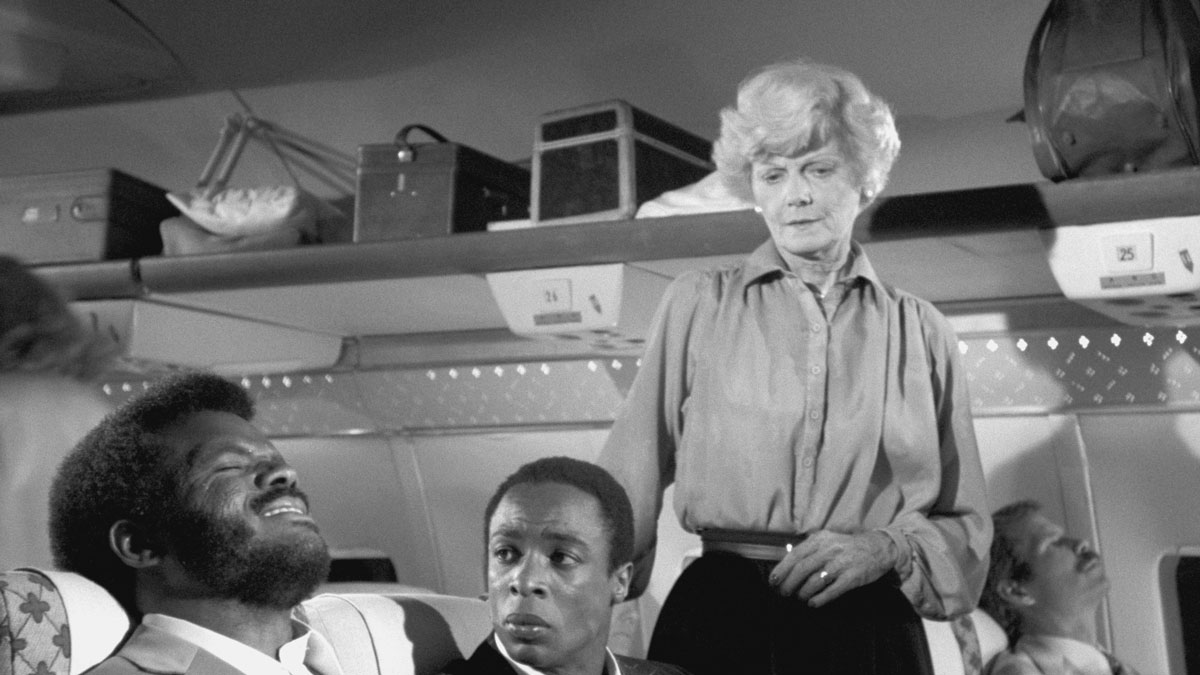 Barbara Billingsley as jive translator in “Airplane!” (Paramount Pictures)David Zucker: We can’t remember who came up with “How about Ethel Merman and it is really Ethel Merman?” and the other two cracked up. We trusted our reactions to a joke. Someone suggested, “Surely you can’t be serious? . . . “And don’t call me Shirley,” and someone cracked up. All these things were first laughed at in the writing room.
Barbara Billingsley as jive translator in “Airplane!” (Paramount Pictures)David Zucker: We can’t remember who came up with “How about Ethel Merman and it is really Ethel Merman?” and the other two cracked up. We trusted our reactions to a joke. Someone suggested, “Surely you can’t be serious? . . . “And don’t call me Shirley,” and someone cracked up. All these things were first laughed at in the writing room.
Abrahams: There was nothing more fun when “Airplane!” came out and because no one knew us, we could go to the movie and sit with a full house and bathe ourselves in that laughter.
Jerry Zucker: Which is what I hate about streaming now. You sit with three people or by yourself, you just don’t get that communal experience, which is terrible.
Abrahams: I hate to see the end of theaters and theatrical experience with hundreds of people, and you hear other laughs. It’s the best way to watch comedies.
What observations do you have on why you work so well together with each other and everyone else? The book doesn’t feature much dirt.
Jerry Zucker: We decided not to talk about Jim and David’s drug problems . . .
Abrahams: We did have rules about collaborating. You can argue a joke on its merits from now until the cows come home, but you can’t get personal. You can’t say, “That’s not funny, you a**hole!”
But you just did!
Jerry Zucker: We’ve known each other since we were kids, and we’ve been doing comedy for a long, long time. We never got into the Hollywood scene very much. We didn’t have many famous friends or were hanging with other actors and directors. We met John Landis. We were a very tight group. It was like “The Godfather” — you don’t go against the family. And also, it helped having just the three of us. It was a quick decision; you vote.
David Zucker: Our lives were centered around Pico Boulevard where our theater was. We were in LA, but it was enough distance from Hollywood. There was another crowd at the Comedy Store. A strain of humor developed there, and that was different, too. You would see Letterman, and Leno and Robin Williams.
Jerry Zucker: We never tried to do anything individually without the others. We didn’t audition for an acting job or a writing job. We were a team.
Abrahams: One of the cool things about writing books was we got to collaborate again, and it’s been fun going back and seeing how the same chemistry is still there and it still works. The other day we were doing an audio ad, and we came up with, “Every page has pictures, and every page has words, and every page has its own page number.”
Your dedication is the best dedication I’ve seen in a book, and I work in publishing. What is your favorite line, joke or sight gag? What were you surprised you got away with?
David Zucker: My favorite has always been when the stewardess says, “I’ve never been so scared, and besides, I am 26 and I’m not married.” And the other lady comes in and says, “I’ve never been so scared, but at least I’ve got a husband!” It was a gag written very collaboratively. We each added to it. It was written, “I’m 26 and I’m not married.” It’s a gag that plays in one shot, and it always worked. It worked 43 years ago, it works today, and it will work 43 years from now.
Jerry Zucker: It’s hard to pick a favorite line. There are so many jokes that I would consider favorites. I will say, when the movie was out, we would periodically stop by at a theatre and time it so we could see, “Have you ever seen a grown man naked?” Because the reaction to that was like a roar because it was just so outrageous and so unexpected to see Peter Graves saying that and that other one.
Want a daily wrap-up of all the news and commentary Salon has to offer? Subscribe to our morning newsletter, Crash Course.
Do you like gladiator movies?
Jerry Zucker: We just kept going. I just love hearing the audience react to that. Have you ever been in a Turkish prison . . . ?
David Zucker: Matt Stone says in the book, he was 11, and he knew it was funny, but he didn’t know why.
I had the exact same reaction! The first line clued me, and it was weird and uncomfortable, but at 11, I didn’t get the subtext.
Jerry Zucker: The funniest thing, which is in the book, is Rossie Harris, who played Joey, didn’t know what it was all about, and he talks about finally figuring it out!
Abrahams: I think among my favorites which vary from week to week, but consistently and among the most dangerous, was subtitling the Black guys. We came across the idea in 1975 when we saw “Shaft.” We enjoyed it, but we weren’t sure what the Black guys in the movie were saying. We thought: Wouldn’t it be fun to subtitle them with stupid white guy interpretations of what they were saying? In the film I was hopeful that we did it with that intention coming across. When the movie first opened, we went to see it with an entirely Black audience, and I remember holding my breath as that first scene came up and they laughed at least as hard, maybe even harder, than white audiences did.
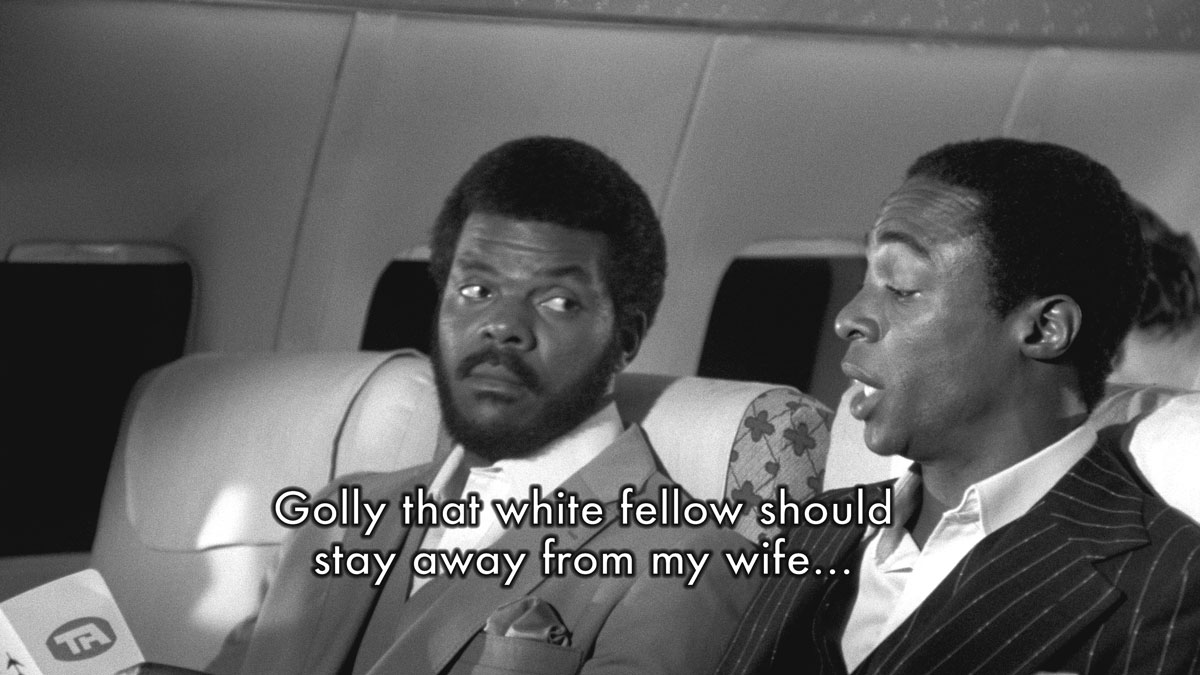 Al White and Norman Alexander Gibbs as jive dudes in “Airplane!” (Paramount Pictures)
Al White and Norman Alexander Gibbs as jive dudes in “Airplane!” (Paramount Pictures)
“Surely You Can’t Be Serious” is available Oct. 3.
Read more
about ’80s comedies
